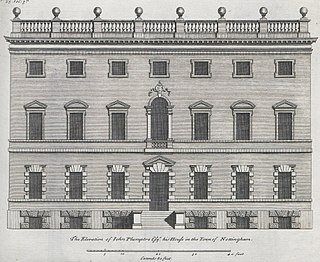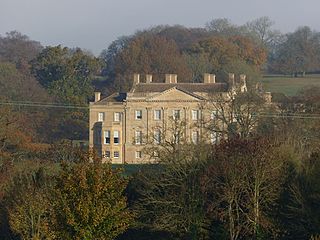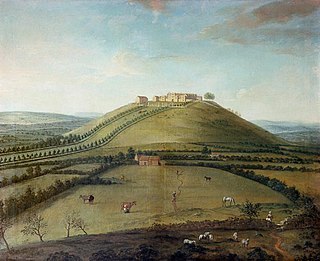Related Research Articles
Uvedale Tomkins Price, of Poston Lodge and Foxley, Yazor, Herefordshire, was a British Tory and later Whig politician who sat in the House of Commons between 1713 and 1734.
The office of High Sheriff of Cardiganshire was established in 1541, since when a high sheriff was appointed annually until 1974 when the office was transformed into that of High Sheriff of Dyfed as part of the creation of Dyfed from the amalgamation of Cardiganshire, Carmarthenshire and Pembrokeshire. Between the Edwardian Conquest of Wales in 1282 and the establishment of the High Sheriff of Cardiganshire, the sheriff's duties were mainly the responsibility of the coroner and the Custos Rotulorum of Cardiganshire. The office of High Sheriff remained first in precedence in the county until the reign of Edward VII when an Order in Council in 1908 gave the Lord Lieutenant of Cardiganshire the prime office under the Crown as the sovereign's personal representative.
Thomas Lewis of Soberton, Hampshire, was a British Tory and then Whig politician who sat in the House of Commons between 1708 and 1736.
John Griffith (V) was a Welsh politician who sat in the House of Commons from 1715 to 1740.

Thomas Salusbury, of Shotwick Park, near Chester, born as Thomas Brereton, was a British Whig politician who sat in the House of Commons between 1724 and 1756. He was also Lord Mayor of Liverpool.
John Rudge, of Mark Lane, London and Evesham Abbey, Worcestershire, was a London merchant and financier, and Whig politician who sat in the House of Commons almost continuously between 1698 and 1734. He was a Governor of the Bank of England from 1713 to 1715.
John Vaughan, 2nd Viscount Lisburne was a Welsh landowner and Whig politician who sat in the British House of Commons from 1727 to 1734. Apparently a heavy drinker, who kept several mistresses, he informally separated from his second wife in 1729 after she had an affair with his land agent. His spending badly impaired the financial soundness of his estate, and his brother and successor had to contend with the claims of Lisburne's wife's son on the estate.

Thomas Johnes was a Welsh politician who sat in the House of Commons between 1777 and 1780.

Sir Thomas Reade, 4th Baronet of Shipton Court, Oxfordshire was a British courtier and Whig politician who sat in the House of Commons for 34 years from 1713 to 1747.

John Plumptre, of Plumptre House, Nottingham, was a British Whig politician who sat in the English and British House of Commons between 1706 and 1751.

Edmund Bray (1686–1725) of Barrington Park, Gloucestershire was a British politician who sat in the English House of Commons from 1701 to 1708 and in the British House of Commons from 1720 to 1722.
Sir Charles Kemeys, 4th Baronet (1688–1735) was a British Tory politician who sat in the House of Commons between 1713 and 1734.

Sir Henry Hoghton, 5th Baronet (c.1678–1768) of Hoghton Tower, Lancashire was a British politician who sat in the House of Commons between 1710 and 1741. He had strong dissenting religious views which sustained his militancy against the Jacobite rebellions.
William Jessop of Broom Hall, Sheffield, Yorkshire, was an English lawyer, and Whig politician who sat in the English and British House of Commons for 32 years between 1702 and 1734. He was a judge on the Anglesey and Chester circuits.
Richard Reynell (c.1681–1734) of East Ogwell and Denbury, near Ashburton, Devon was an English landowner and Tory politician who sat in the English House of Commons from 1702 to 1708 and in the British House of Commons from 1711 to 1734.
John Weaver (1675–1747), of Morville, near Bridgnorth, Shropshire, was a British lawyer and Whig politician who sat in the House of Commons from 1713 to 1734.
George Trenchard, of Lytchett Matravers, near Poole, Dorset, was a British landowner and Whig politician who sat in the House of Commons for 35 years between 1713 and 1754.
Sir Robert Kemp, 3rd Baronet (1667–1734), of Hoxne and Ubbeston, Suffolk, was an English landowner and Tory politician who sat in the House of Commons between 1701 and 1734.

Walter Lloyd, of Peterwell, Cardiganshire, was a British lawyer and Whig politician who sat in the House of Commons from 1734 to 1742.
John Lloyd of Peterwell, Cardiganshire, was a British lawyer and Whig politician who sat in the House of Commons from 1747 to 1755.
References
- 1 2 3 ".JOHNES, Thomas (d. c.1734), of Llanfair Clydogau, Card. and Dolau Cothi, Carm". History of Parliament Online. Retrieved 6 August 2018.